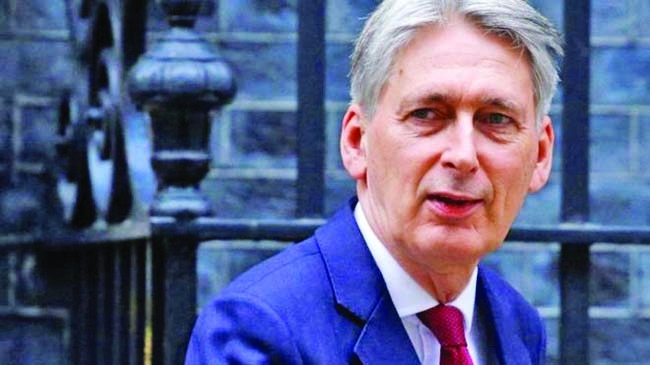Brexit will leave UK economy worse off

All forms of Brexit will make the UK worse off but Theresa May's plan is the best available, says Philip Hammond. Analysis of the prime minister's Brexit deal shows the economy will be "slightly smaller", he told BBC Radio 4's Today program.
But it was not just about the economy, he argued, and her plan would deliver "political benefits" as well. It comes as the government is due to publish its economic analysis on the long-term effects of Brexit on the UK. The Treasury will set out various scenarios - with the Daily Telegraph saying it will predict £150bn in lost output over 15 years under no deal, with Theresa May's plan costing £40bn. With two weeks until MPs vote on the deal, Mr Hammond said: "We're going to go out and we're going to sell this deal."
He said if the deal was not voted through Parliament, May's cabinet would sit down and "decide how best to proceed". Under any scenario, in a "purely economic sense" the UK will be worse off than if it stayed in the EU, as exiting will created "impediments to our trade", said the chancellor. He argued that staying in the EU was not politically "viable". And the government's planned Brexit deal combines most of the economic benefits of remaining in the EU with the political benefits of leaving the EU.
"What the prime minister's deal does is absolutely minimizes those costs, and reduces to an absolute minimum the economic impact of leaving the EU, while delivering the political benefits, in terms of being able to do third-country trade deals, having control of our fishing waters, and the many other issues that will be delivered politically," he told the Today program. Meanwhile, the PM will visit Scotland and argue she was "robust" in defending UK fishing in her Brexit talks.
According to the Daily Telegraph, the Treasury analysis will show that under May's deal, the UK's GDP will be between 1% and 2% lower over 15 years than if it stayed in the EU, compared with 7.5% lower under a no deal situation.
The Department for Exiting the EU said it does not comment on leaks. The Telegraph also quotes the former Brexit Secretary Dominic Raab saying the Treasury's analysis "looks like a rehash of Project Fear". In other developments, the Commons Public Accounts Committee issued a report warning of a "real prospect" of "major disruption" at UK ports in the case of a no-deal Brexit.
MPs are due to vote on May's Brexit deal, which she insists is the only option, on 11 December. Against this backdrop, the prime minister is visiting different parts of the UK to engage directly with the public and businesses in a bid to build support for the deal.
She insisted it protected the "vital interests" of the whole of the UK when visiting Wales and Northern Ireland on Tuesday, while denying claims from DUP leader Arlene Foster that she had "given up" on negotiations before agreeing the Brexit deal. During a visit near Glasgow, May will speak to factory workers about how she believes her deal provides an "unprecedented economic relationship that no other major economy has" and certainty for employers and their staff.
"We will be free to strike our own trade deals around the world, providing even greater opportunity to Scottish exporters," she will say. She will also say that moving away from the EU's common fisheries policy (CFP) "which has so tragically failed Scotland's coastal communities" will leave the UK "free to decide for ourselves who we allow to fish in our waters".
The UK sells nearly £1bn of fish produce to the EU every year, and a number of EU countries are insisting that tariff-free trade of that kind can continue only if EU fishing boats continue to get access to UK waters. The party says access to UK waters for EU boats will be used as a "bargaining chip" to secure a good post-Brexit trade deal.
Media captionNicola Sturgeon said that no Scottish government could possibly accept a deal which left the country poorer. And Scottish First Minister Nicola Sturgeon has unveiled analysis the SNP claims shows Scotland would be left poorer by the deal. Her party, which has 35 MPs, along with the leadership of Labor, the Lib Dems and Democratic Unionists has all said they will reject May's deal.
Many Tories have also said publicly they are opposed to May's deal. Meanwhile, a row is brewing after the Labor party demanded the government publish its full legal advice on the Brexit deal this week. The government has only said it will publish a "full reasoned position statement" laying its out political and legal position on the withdrawal agreement.
BBC Newsnight political editor Nick Watt said a source says the full advice provides a "very stark warning" that there is no way the UK, on its own, would be able to get out of the so-called Northern Ireland backstop. The backstop - the plan to create a temporary single customs territory to prevent the return of customs posts at the Irish border in the event no EU-UK trade deal comes into force - is controversial because Brexiteers fear it would keep the UK tied to EU rules indefinitely.
